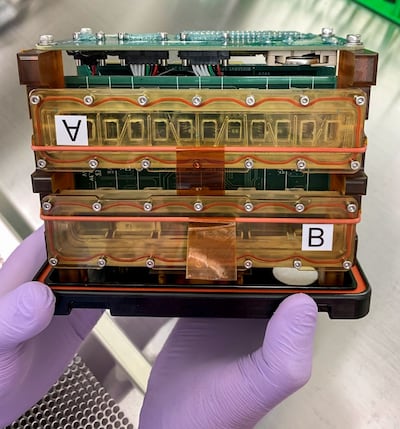UAE astronaut Sultan Al Neyadi is set to take part in a scientific experiment in space, studying human heart tissue.
It is hoped the research will help scientists back on Earth to devise therapy and medication that could prevent people developing heart disease.
Cardiovascular disease is the leading cause of death globally, says the World Health Organisation, with about 17.9 million lives lost each year.
The Engineered Heart Tissues 2 experiment, led by the John Hopkins University, could also help mitigate the effects of microgravity in astronauts' hearts during space travel.
Researchers behind the study spoke about the experiments during a press conference held by Nasa on Tuesday.
“This research is not only critical for the future of space exploration, but also critical for the health and well-being of people here on Earth, as we try to better understand and combat the effects of age-related cardiovascular dysfunction,” said Devin Mair, of Johns Hopkins.

The experiment involves eight chambers that each contain six tissues.
They are placed over magnetic sensors on a circuit board to measure contractile function of the heart tissues, demonstrating the rate at which the cardiac muscle contracts.
This is the second such study that Johns Hopkins is helping to conduct on the International Space Station.
Effects of microgravity
The initial Engineered Heart Tissues experiment in 2020 showed that the tissues, when exposed to microgravity, changed at the cellular and tissue level — an early indication of the development of cardiac disease.
This latest investigation tests whether new therapy could prevent these effects.
For example, Dr Al Neyadi and his colleagues will use FDA-approved medication on the tissues sent by Johns Hopkins, which could help develop improved medication for heart disease in future.
“All of the drugs and pharmaceuticals that we are testing on the International Space Station are FDA approved currently, so theoretically, they could be applied [to people on Earth] as soon as our results come in,” Mr Mair said.
“However, I of course, want to caution that while they are human heart tissue, they are neglecting the effects of other tissues in our human body.
“So, while the results might be very interesting, and could eventually lead to treatments for age related cardiovascular dysfunction here on earth, there obviously needs to be further studies, especially human studies, to confirm the results in a full systemic model rather than just an isolated heart tissue.”
Increasingly important issue
The study will also look in-depth at how astronauts' heart health in space can improve.
Many studies have shown that microgravity causes changes in a human heart, particularly during long-duration flight.
Dr Al Neyadi will be spending six months on the orbiting laboratory, but some astronauts have been there for a year.
As space agencies and companies work towards sending astronauts on missions to the Moon and Mars, solving this problem has become more important.
“There are unique stresses found in space flight that offer exceptional challenges to our bodies, which they can struggle to overcome,” Mr Mair said.
“One of the most significant of the challenges are the hazardous effects of space flight on the cardiovascular system.
“Previous human and animal studies have verified that exposure to microgravity or the apparent lack of gravity as found on the International Space Station can lead to a variety of cardiovascular problems.
“This can include decreased cardiac output, loss of cardiac muscle mass and serious cardiac arrhythmias.
“This in turn can lead to severe consequences for astronauts, including increased risk of heart disease and stroke.”
The experiment is one among 60 other investigations to be conducted on the ISS in which Dr Al Neyadi and his colleagues will participate.
SpaceX will launch the resupply mission on Wednesday from the Kennedy Space Centre in Florida.
Another experiment is the ISS External Microorganisms, which requires astronauts to collect samples from outside the station during spacewalks.
Findings would help researchers determine whether crewed spacecraft and spacesuits need to be changed to limit the spread of contamination from Earth on future exploration missions.

